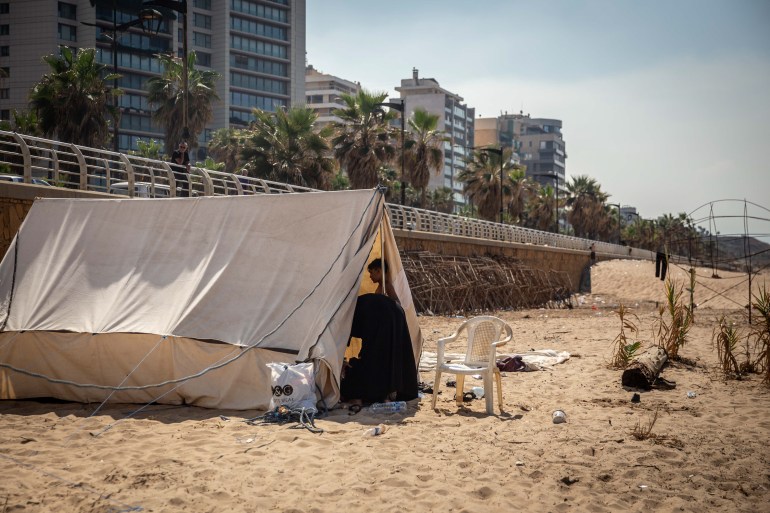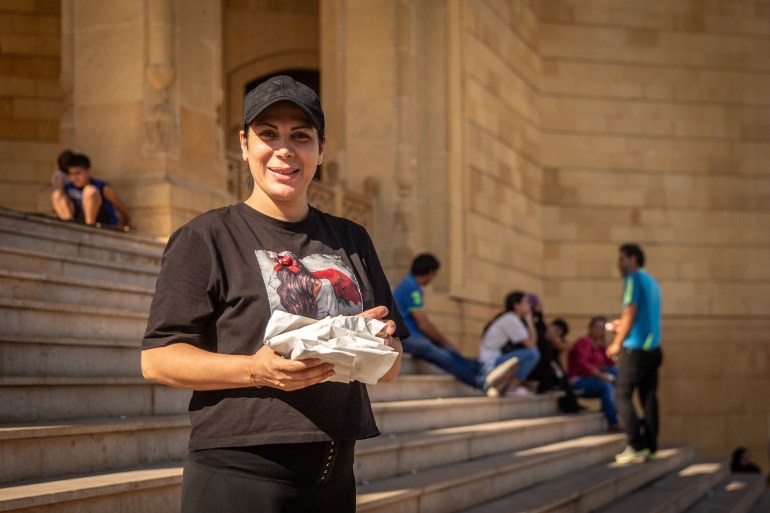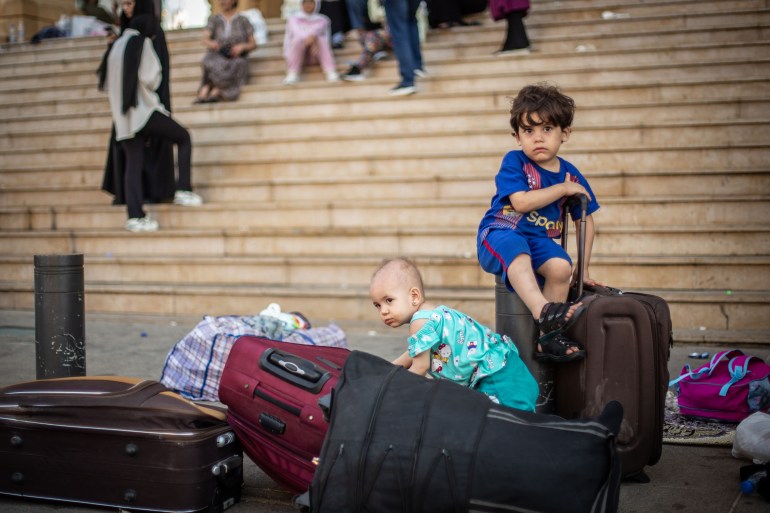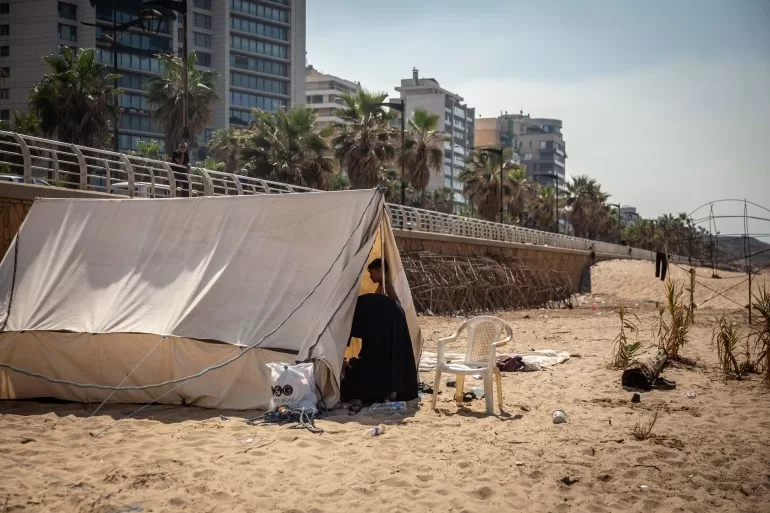Beirut, Lebanon – On Friday evening, Mariam* was in her apartment with her teenage daughter and mother when her building began rumbling and shaking. Agonising screams and the buzzing of Israeli warplanes soon followed.
Israel had just launched a major air attack that killed Hezbollah’s leader Hassan Nasrallah, as well as an unknown number of civilians in Dahiyeh, the southern suburb of Lebanon’s capital Beirut.
Shortly after the strike, Israel called on thousands of civilians to “evacuate” from Dahiyeh, claiming they were living near Hezbollah operation centres.
Mariam quickly packed a few bags of clothes and fled to downtown Beirut, where she is now sleeping on the steps of a mosque with hundreds of other people displaced from her community.
But while Israel has upended her life, she said that nothing compared to the anguish of losing Nasrallah.
“When I first heard the news, I thought it was a lie. I thought, ‘It can’t be true’,” she told Al Jazeera, holding back her tears. “Nasrallah was our brother and we always felt safe with him. Now, we don’t know what will be our fate.”

A brother, a father
Nasrallah became Hezbollah’s leader after Israel assassinated his predecessor, Abbas al-Musawi, in 1992. Al-Musawi, his wife and five-year-old son were killed by an air strike on their home.
Once Nasrallah took over, he quickly began expanding Hezbollah from a rebel movement to one of the most powerful armed groups in the world as well as a formidable bulwark against Israeli aggression.
Under his stewardship, Hezbollah liberated south Lebanon from Israel’s 18-year occupation, lending him the status of a hero throughout the region.
His charisma and shrewdness made him one of the most respected – and feared – leaders in the Middle East.
He then became a polarising figure – in Lebanon and the region – after Hezbollah intervened in Syria’s civil war to rescue President Bashar al-Assad from a pro-democracy uprising that quickly turned into an armed conflict after al-Assad’s forces turned their guns on protesters, leading to the deaths of hundreds of thousands.
Throughout the war, the Syrian government and Hezbollah committed atrocities, according to news reports and rights groups.
These reports damaged Nasrallah’s popularity across the region but his most fervent supporters stood by him out of fear that nobody else would be able or willing to protect Lebanon from Israel.
Many Lebanese Shia Muslims are now mourning a man they call a “brother” and even a “father” to their people.
In downtown Beirut, displaced families from Dahiyeh described Nasrallah as a “martyr” who gave his life to stand up to Israel.
“I just want to listen to his voice again. He was like a father to us. He wasn’t just a politician,” said Nivine, a Hezbollah supporter and Dahiyeh resident who has been uprooted by the strikes.
“But we will continue on [Nasrallah’s path]. We will continue to fight to bring down Israel, which was always his wish,” she told Al Jazeera.

Lack of protection?
With Nasrallah gone and Hezbollah reeling from losing scores of senior commanders in recent days, many Lebanese Shia Muslims fear they have nobody to protect them.
“Don’t you see all the crimes of Israel? They are bombing and destroying everything, killing women and children. And no Arabic or Western country is intervening to stop it,” Nivine said.
But Nivine, like other residents from Dahiyeh, believes that Hezbollah will ultimately survive the recent blows from Israel.
Hassan, 25, spoke matter-of-factly about Nasrallah and the “resistance” – a term commonly referring to Hezbollah and other Iran-aligned armed groups that oppose Israel and the US role in the region.
“We will continue and the movement will continue. People will be martyred, but [the resistance] will continue,” he told Al Jazeera.
Hassan added that he was particularly upset about Nasrallah’s death because he was such a major symbol of defiance. In his view, Nasrallah was the only world leader to help Palestinians in Gaza by opening a “support front” against Israel from southern Lebanon.
Hezbollah has said that its aim is to relieve pressure on Hamas, which is fighting for its survival after launching an attack on southern Israel on October 7, which killed 1,139 people.
Israel responded by attacking Gaza and killing more than 40,000 people since October.
Nasrallah’s decision to support Hamas cost him his life.
“He stood up for Gaza,” Hassan said with resignation on the steps of a mosque. “I know he died. But he’s in a better place now than the one we are all living in.”

Uncertain future
Mohamad, a Syrian national who has been living in Lebanon since 2009, said that he fled from south Lebanon to Dahiyeh after Israel and Hezbollah began to exchange fire on October 8, 2023.
He said the bustling neighbourhood welcomed him, his daughter and his wife to the community soon after they arrived.
He, too, is mourning Nasrallah.
‘I was in shock when I heard the news. We will remember him as the one that stood up to the Zionists and went to war with Israel,” he told Al Jazeera.
“But now that he’s gone, there is fear and uncertainty. We don’t know what will happen. Will there be more bombing now across Beirut? Will the situation get worse? Or will it stop? Nobody knows.”
Mariam, who fled with her mother and daughter, expressed the same ambivalence about her life and the fate of Lebanon. Everything dear to her has been torn apart due to Israel’s relentless bombing of Dahiyeh in the last 24 hours, she said.
She is mourning the loss of a neighbourhood that envelops a lifetime of memories – good and bad. She is also grieving the loss of several friends, many of whom were killed in Israeli strikes, and others who remain missing. But like many people from her community, she said Nasrallah’s death is the toughest news to swallow.
“We felt safe when he was here with us,” she said, her eyes filling with tears. “Now, we don’t know if we’ll ever be safe again.”
